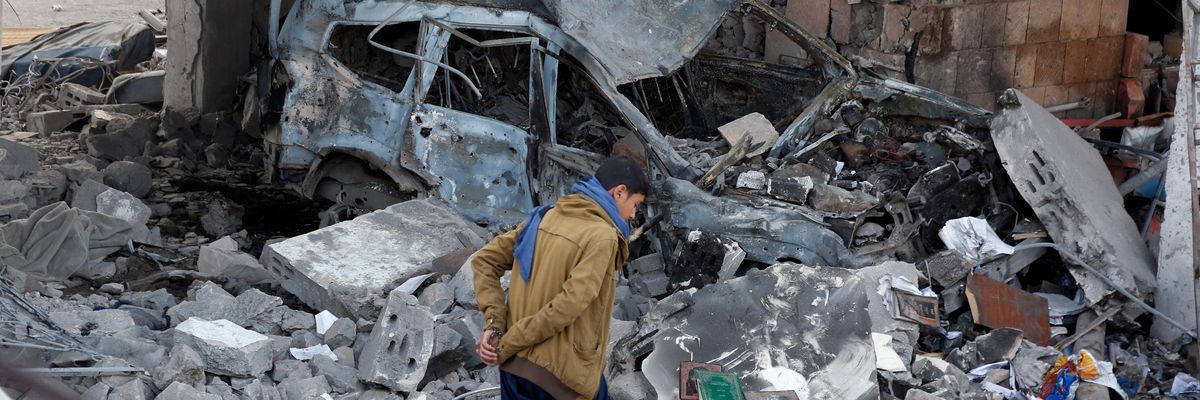Human rights advocates and some congressional Democrats on Wednesday cautiously welcomed
Washington Postreporting that the Biden administration has created a program to track and investigate allegations of foreign forces harming or killing civilians with weapons provided by the United States.
"The United States clearly has a vested interest in knowing what harm its weapons sales and security assistance cause to civilians," Human Rights Watch (HRW) deputy Washington director Nicole Widdersheim told the newspaper. "Let's see if the Biden administration puts political will behind this good idea."
Annie Shiel, U.S. advocacy director at the Center for Civilians in Conflict (CIVIC), called the initiative "an important step" but added that "of course, its impact will come down to the details of implementation."
The Quaker group Friends Committee on National Legislation
noted Shiel's remarks on X—formerly Twitter—while celebrating the "positive news... on accountability for harm caused by U.S.-supplied weapons."
"What will actually happen when U.S. officials find U.S. arms have been used in war crime or human rights violation? Will there be meaningful accountability, or will perpetrators just get a slap on the wrist?"
The U.S. State Department, which is leading the program with the help of "personnel from the Pentagon, intelligence community, and other agencies," announced the Civilian Harm Incident Response Guidance (CHIRG) in an August 23 cable to American embassies and consulates, according to the
Post.
A State Department spokesperson
told the Middle East Eye on Wednesday that "CHIRG establishes a process to respond to new incidents of civilian harm and prevent them from recurring, and to drive partners to conduct military operations in accordance with international law," but declined to say whether the probes will be made public.
The new initiative resembles a Defense Department effort
launched last year that focuses on injuries and deaths of noncombatants caused by American forces—one which Shiel said at the time "offers opportunities to address long-standing structural flaws in U.S. policy and practice, prevent future harm, and provide civilians harmed by U.S. operations with the recognition and response they deserve."
U.S. Senate Foreign Relations Committee Chairman Bob Menendez (D-N.J.)
said on social media that he was "pleased to see" the State Department adopting an element of the Safeguarding Human Rights in Arms Exports Act, which he introduced with House Foreign Affairs Committee Ranking Member Gregory Meeks (D-N.Y.).
Passing such legislation, the
Post pointed out, "would ensure that the new procedures can't be abolished by a future administration, along with establishing other steps to prioritize rights concerns in arms sales."
U.S. Sen. Elizabeth Warren (D-Mass.) on Wednesday also welcomed the new program while highlighting her related efforts on Capitol Hill. Over the past year, she has joined Sens. Bernie Sanders (I-Vt.) and Mike Lee (R-Utah) in
sending letters to the departments of Defense and State about the United States' complicity in civilian harm in Yemen.
CIVIC advocacy and legal fellow John Ramming Chappell stressed on X that the program "comes after years of congressional pressure" and "would not have been developed without demand from the Hill."
"Questions remain, of course," he noted. "What will actually happen when U.S. officials find U.S. arms have been used in war crime or human rights violation? Will there be meaningful accountability, or will perpetrators just get a slap on the wrist? Will close partners get special treatment?"
Former longtime HRW executive director Kenneth Roth also raised a question: "But what about forces armed by the U.S. that use other arms to kill civilians? That's wrong, too."
Brian Finucane, a former State Department lawyer who is now a Crisis Group senior adviser, wrote on social media that the program is "a notable step" in monitoring civilian deaths and injuries but also warned observers to "be wary of relying on U.S. embassies, given 'clientitis.'"
Finucane added that such monitoring "is more likely to be effective" if it is "statutory-mandated" versus administrative policy, is "as independent as possible to insulate from those in bureaucracy with interests in selling arms," and incorporates information from all sources.
